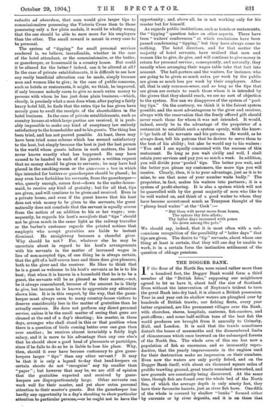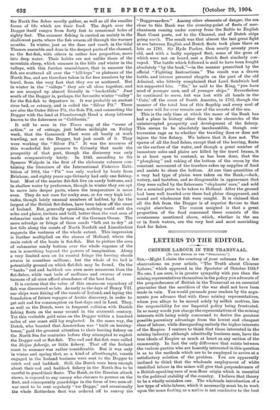I F the floor of the North Sea were raised rather
more than a hundred feet, the Dogger Bank would form a third member of the "British Isles," supposing our neighbours agreed to let us have it, about half the size of Scotland. Even without the intervention of Neptune's trident to turn the great Bank into dry land, it is almost a British possession. Year in and year out its shallow waters are ploughed over by hundreds of British trawls ; our fishing fleets, every year better organised, are like permanent villages over the Bank, with churches, stores, hospitals, canteens, fish-carriers, and post-offices ; and some half-million tons of the best fish the world produces are brought from it annually to Grimsby, Hull, and London. It is said that the trawls sometimes disturb the bones of mammoths and the dismembered limbs of rhinoceroses which once browsed on the submerged forests of the North Sea. The whole area of this sea has now a population of fish so enormous, and so incessantly repro- ductive, that the yearly improvements in the engines used for their destruction make no impression on their numbers. Even now the waters are only partly fished, and on the Dogger Bank itself, with about six thousand square miles of prolific trawling ground, great tracts remained unworked, and new grounds are constantly being discovered. At the same time, though fish are found over the whole bed of the North Sea, of which the average depth is only ninety feet, they have their favourite haunts, just as river fish have. One-fifth of the whole is covered by shallow " banks " formed either by currents or by river deposits, and it is on these that
the North Sea fishes mostly gather, as well as all the smaller forms of life which are their food. The depth over the Dogger itself ranges from forty feet to occasional holes of eighty feet. The summer fishing is carried on mainly in the shallowest parts, where the fish swarm all through the warmer months. In winter, just as the dace and roach in the tidal Thames assemble and doze in the deepest parts of the channel, so the flat-fish, with others in rather less proportion, move into deep water. Their habits are not unlike those of the mountain sheep, which summer in the hills and winter in the valleys, with this further resemblance, that in summer the fish are scattered all over the " hill-tops" or plateaux of the North Sea, and are therefore taken in far less numbers by the trawl, from the very fact that they are so scattered. But in winter in the "valleys " they are all close together, and so are scooped up almost literally in "bucketfuls." Just south of the Dogger is, perhaps, the favourite winter "valley" for the flat-fish to depasture in. It was probably an ancient river bed, or estuary, and is called the " Silver Pit." There are also the Outer Silver Pit, the Sole Pit, and connecting the Dogger with the land at Flamborough Head a stony isthmus known to the fishermen as "California."
It will be seen in the Times map of the "scene of action," or of outrage, just before midnight on Friday week, that the Gamecock Fleet were all busily at work trawling, not on the Dogger, but just south of it. They were working the " Silver Pit." It was the nearness of this wonderful fish preserve to Grimsby that made the prosperity of that port, though the discovery was only made comparatively lately. In 1843, according to Sir Spencer Walpole in the first of the elaborate volumes con- taining the literature of the International Fisheries Exhi- bition of 1884, the " Pit" was only worked by boats from Brigham; and eighty years ago Grimsby had only one fishing- boat. Most of the marine flat-fish live on sandy bottoms, and in shallow water by preference, though in winter they are apt to move into deeper parts, where the temperature is more even. They do not care for rocky seas, or for very high lati- tudes, though lately unusual numbers of halibut, by far the largest of the British flat-fishes, have been taken off the coast of Iceland. But, generally speaking, nothing could suit the soles and plaice, turbots and brill, better than the vast area of submarine sands at the bottom of the German Ocean. The mere selvedge or fringe of these sands "left out to dry" at low tide along the coasts of North Norfolk and Lincolnshire suggests the vastness of the whole extent. This impression is further multiplied on the shores of Holland, where the main catch of the boats is flat-fish. But to picture the area of submarine sandy bottom over the whole expanse of the sea is something beyond the powers of imagination. Along a very limited area on its coastal fringe the herring shoals swarm in countless millions ; but the whole of its bed is potentially ground on which flat-fish may be found. On the " banks " cod and haddock are even more numerous than the flat-fishes, while vast beds of molluscs and swarms of crus- taceans of all sizes afford abundance of the best food.
It is curious that the value of this enormous repository of fish was discovered so late. As early as the days of Henry VII. our ships were fishing off the coasts of Iceland, and laying the foundation of future voyages of Arctic discovery, in order to get salt cod for consumption on fast-days and in Lent. They, as well as the Dutch, were in frequent collision with Danish fishing fleets on the same errand in the sixteenth century. Yet this veritable gold mine on the Dogger within a hundred miles of our coast still lay neglected. In the same way, the Dutch, who boasted that Amsterdam was " built on herring- bones," paid the greatest attention to their herring fishery on the North Sea for centuries before they attempted to exploit the Dogger cod or flat-fish. The cod and flat-fish were called the klezjne fisherije, or little fishery. That off the Iceland coast in summer was rather considerable. But it was only in winter and spring that, as a kind of afterthought, vessels engaged in the Iceland business were sent to the Dogger to catch cod and haddock. Still, the Dutch were keen enough about their cod and haddock fishery in the North Sea to be careful to guard their fleets. The Bank, as the Russian attack shows, is exposed to any enemy who chooses to pounce on the fleet, and consequently guardships in the form of two men-of- war used to be sent regularly " ter Dogge," and occasionally the whole Rotterdam fleet was ordered off to convoy the "Doggevaarders." Among other elements of danger, the sea close to this Bank was the crossing-point of fleets of mer- chantmen coming under convoy from the Baltic to English East Coast ports, not to the Channel, and of Dutch ships going north. The result was that almost the last great fight at sea between English and Dutch fleets took place there as late as 1781. Sir Hyde Parker, then nearly seventy years old, and with a badly equipped fleet, some of the guns of which were not on board, met a Dutch fleet similarly con- voyed. The battle which followed is said to have been fought absolutely " by the book,"—in the manner prescribed by the official "Fighting Instructions." The result was a drawn battle, and intense personal chagrin on the part of the old Admiral, who bitterly complained that Lord Sandwich had not supported him. " Sir," he said to the King, "you have need of younger men, and of younger ships." Nevertheless be continued to serve, but was lost with all hands in the Cato,' off the coast of South America, in 1782, though the manner of the total loss of this flagship and every soul of her crew will for ever remain one of the secrets of the sea. This is the only time at which the name of the Bank has had a place in history other than in the chronicles of the uninterrupted prosperity and development of the fishery. This seems to be absolutely inexhaustible, though con- troversies rage as to whether the trawling does or does not injure the line fishery. We believe that it does not. The spawn of all the food fishes, except that of the herring, floats on the surface of the water, and though a great number of immature soles and plaice are killed by the trawl beams, it is at least open to contend, as has been done, that the "ploughing" and raking of the bottom of the ocean by the constant movement of the trawlers rakes up supplies of food and assists to clean the bottom. At one time quantities of a very bad type of plaice were taken on the Bank,—dark, watery, and tasteless, and so disagreeable in appearance that they were called by the fishermen "elephants' ears," and sold for a nominal price to be taken to Holland. After the ground had been well trawled over these bad plaice disappeared, and sound and wholesome fish were caught. It is claimed that all the fish from the Dogger is of superior flavour to that caught elsewhere. The reason assigned is that a great proportion of the food consumed there consists of the crustaceans mentioned above, which, whether in the sea or in fresh waters, are the very best and most nourishing food for fishes.



















































 Previous page
Previous page